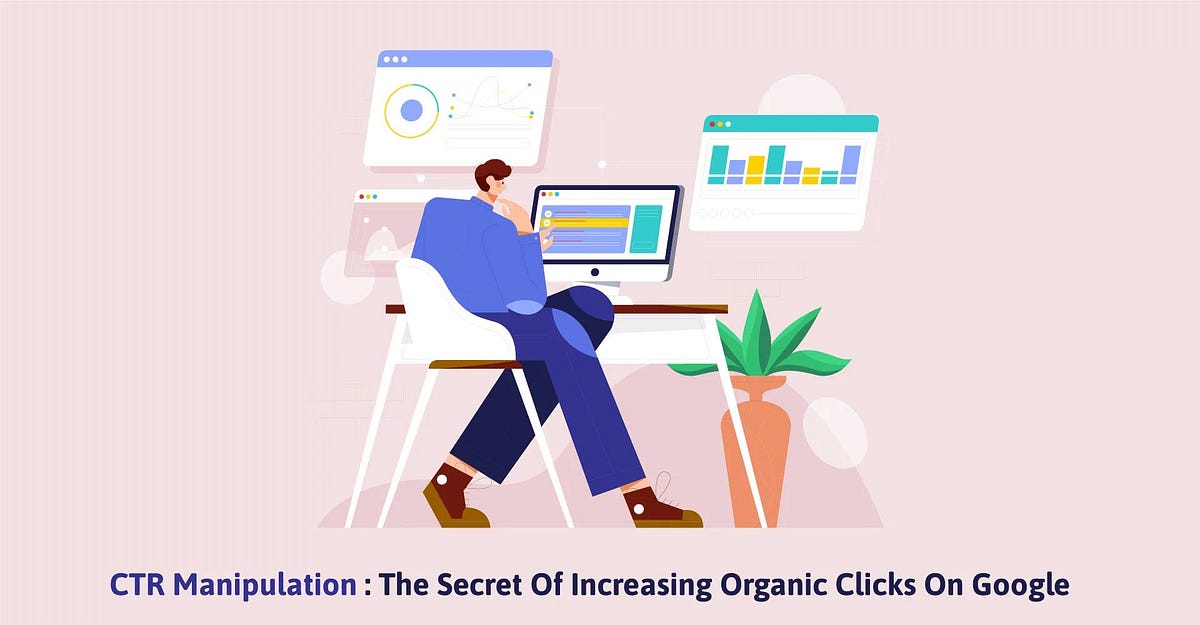Discovering the Relationship In Between CTR Manipulation Solutions and User Habits
In the world of digital marketing, the influence of click-through rate (CTR) manipulation services on customer actions continues to be a complex and fascinating topic. By studying the detailed partnership in between CTR control services and individual habits, fascinating understandings arise that may reshape our understanding of electronic advertising approaches and their effects on consumers.
Effect of CTR Manipulation on Habits
Evaluating the impact of Click-Through Price (CTR) control on user behavior reveals important insights into the dynamics of online involvement. CTR adjustment entails artificially blowing up the variety of click a certain web link or advertisement to deceive users and internet search engine. This technique can bring about a distorted understanding of a webpage's popularity or significance, inevitably impacting user actions.

In addition, CTR manipulation can alter the data utilized by formulas to customize individual experiences. This can result in customers being served web content that does not straighten with their choices or passions, inevitably resulting in a decrease in individual complete satisfaction and engagement. Comprehending the influence of CTR control on individual actions is necessary for maintaining openness and trust in on the internet communications.
Individual Engagement With Adjusted CTR
User interaction with adjusted CTR data typically results in manipulated perceptions of on-line web content appeal and importance. When users communicate with content based on synthetically inflated Click-Through Rates (CTR), they may think that particular details, products, or solutions are a lot more preferred or trustworthy than they actually are. This can result in users making decisions based upon deceptive data, resulting in possibly unfavorable results.
Involvement metrics like sort, shares, comments, and time spent on a web page are frequently affected by CTR control. Customers might be much more likely to involve with content that shows up to have greater engagement prices, further bolstering the cycle of skewed perceptions. Consequently, content developers and marketers may focus on generating material that produces high CTR instead of focusing on producing genuinely beneficial and pertinent material.

Mental Results of CTR Adjustment

In addition, the psychological effects of CTR manipulation can also materialize in modified decision-making procedures. Customers may be more likely to click web content only based on its viewed appeal, instead of its actual worth or importance to their needs. This behavior change can lead to a superficial engagement with on the internet content, original site where customers may overlook high-quality yet less preferred offerings in favor of those with artificially improved CTRs.
Essentially, the emotional ramifications of CTR adjustment highlight the significance of keeping transparency and credibility in on the internet communications to foster real user involvement and trust.
Moral Considerations in CTR Control
Considering the honest effects of controling click-through prices (CTR) in online systems is crucial for maintaining stability and trust within the digital ecological community. CTR manipulation increases concerns regarding tricking users, distorting information analytics, and endangering the integrity of online content. One significant moral consideration is the prospective influence on user autonomy and decision-making. By synthetically pumping up CTR, customers may be misinformed right into clicking on links or ads they would certainly not have actually chosen otherwise, bring about a disingenuous online experience. CTR control can alter the efficiency metrics that businesses depend on to make tactical choices, ultimately influencing market competition and customer trust fund.
Another ethical facet to ponder read this article is the justness of controling CTR to gain an unfair benefit over competitors. Participating in such practices not just breaches principles of reasonable play however likewise Visit Website undermines the trust fund that individuals put in online systems. It is crucial for organizations and digital marketing experts to maintain moral criteria in their methods to guarantee transparency, trustworthiness, and long-term sustainability in the on-line atmosphere.
Ramifications for Digital Marketing
With the increasing dependence on digital systems for advertising functions, the practice of manipulating click-through rates (CTR) poses significant effects for the performance and honesty of electronic advertising and marketing approaches. CTR manipulation can bring about skewed information analytics, deceiving online marketers into thinking that their projects are doing much better than they in fact are. This can result in misallocation of sources, with companies investing in underperforming approaches based on falsified CTRs. In addition, when individuals understand that CTRs have been adjusted, it can wear down count on in the brand name, leading to long-term negative effects for client loyalty and brand name credibility.
Additionally, using CTR adjustment solutions can produce an unjust competitive landscape, where business that engage in such practices gain a synthetic advantage over those that comply with ethical marketing criteria. This can suppress technology and creative thinking in electronic advertising, as success ends up being more about adjustment methods than providing genuine worth to customers. Inevitably, the effects of CTR control for digital marketing expand past short-term gains, impacting the overall sustainability and credibility of marketing initiatives in the digital realm.
Verdict
To conclude, the partnership between CTR adjustment solutions and user actions is complicated and multifaceted. The influence of CTR control on behavior, customer interaction with manipulated CTR, emotional effects, ethical factors to consider, and ramifications for digital advertising and marketing all play a duty fit this relationship. Recognizing these dynamics is crucial for online marketers and scientists alike in order to navigate the moral implications and take full advantage of the effectiveness of their electronic marketing strategies.